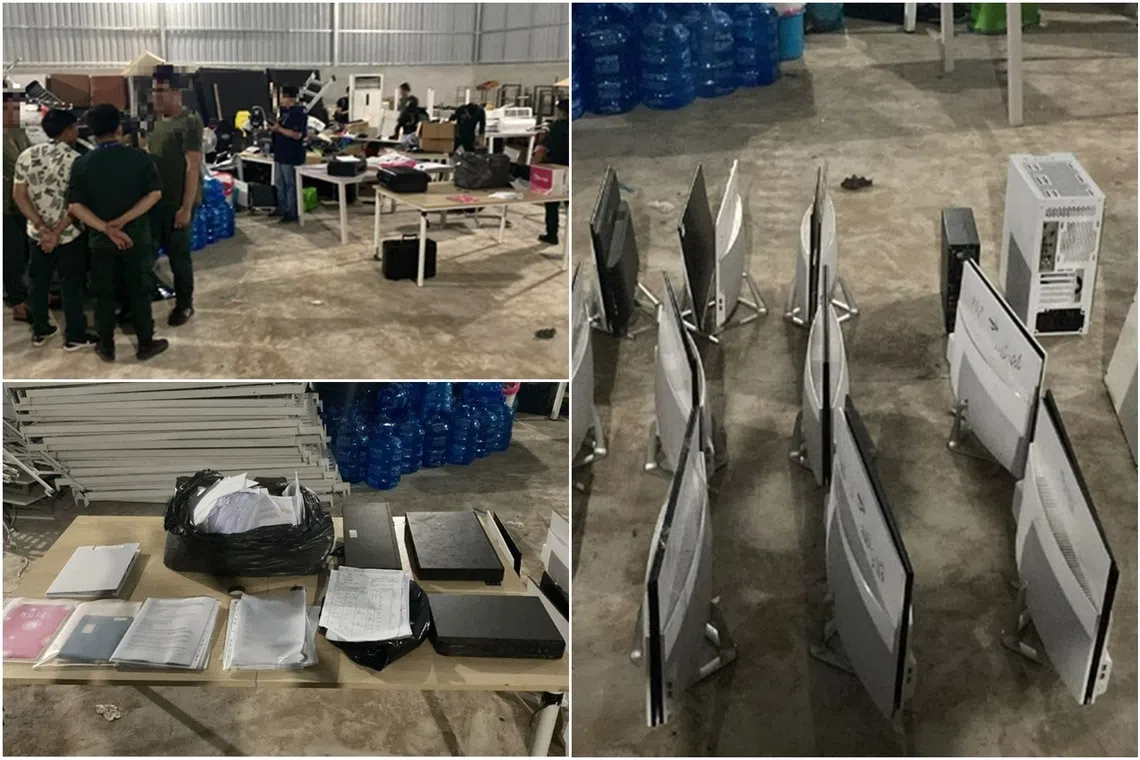Cambodia-based scam gang: Experts say family members are roped in due to trust, lower risks
Sign up now: Get ST's newsletters delivered to your inbox

The group allegedly targeted Singaporeans through government official impersonation scams.
PHOTOS: SINGAPORE POLICE FORCE
- Singaporean brothers allegedly ran a Cambodia-based scam syndicate, involving family members, causing $41 million in losses from 438 cases.
- Experts say family involvement lowers betrayal risk due to trust and shared circumstances, with social and biological factors contributing to crime.
- Past Singaporean cases with familial crime links include illegal gambling and loan shark syndicates.
AI generated
SINGAPORE - Organised crime groups, including the Cambodia-based scam syndicate allegedly led by a pair of Singaporean brothers, may recruit family members to limit the risk of exposure and betrayal. Experts say criminals could involve their family members as they trust them and think they can protect each other when they are caught.
Mr Edwin Sam, a director at Redwood Psychology, which offers forensic psychology services, said there is trust and a sense of loyalty among family members. “All of these can be motivating factors for people to enlist their siblings in activities that carry high risk and are illegal in nature,” he added.
He said family members may also share a common upbringing that shapes their goals and views of the world, adding: “The common goals and views could be to get rich, to gain influence and power.”
Mr Siraj Shaik Aziz, head of criminal defence at Silvester Legal LLC, said the family’s economic circumstances may be another motivation. “They could be facing financial difficulties, and see this as a way out for them together,” he added.
Mr Siraj said there have been several notable cases in Singapore, such as the three Seet brothers who were arrested in 2016
In September, 15 members of an alleged scam syndicate operating out of Cambodia were charged in Singapore under the Organised Crime Act. Thirty-four others were later revealed to be on the run.

The syndicate was allegedly run by fugitive Ng Wei Liang
The group, operating out of Phnom Penh, allegedly targeted Singaporeans through government official impersonation scams and was reportedly involved in 438 cases, leading to at least $41 million in losses.
Ms June Fong, principal psychologist at Promises Healthcare, said that for offences that require significant coordination across countries, the offender is most likely to enlist the help of someone they trust.
She said: “Who better than someone who shares the same antisocial beliefs, who would not challenge them but instead support them in their albeit misguided thinking?”
Associate Professor Olivia Choy of Nanyang Technological University’s psychology department in the School of Social Sciences said families are intimate groups where people learn attitudes and values, including those linked to criminal behaviour.
“If some individuals have law-breaking attitudes rather than law-abiding ones, and those attitudes are shared or taught to another family member, then the family member may learn to view criminal behaviours as permissible activities that they can engage in,” said Prof Choy.
Associate Professor Razwana Begum Abdul Rahim of the Singapore University of Social Sciences said the factors behind families involved in crime could be shared social and economic pressures, and exposure to criminal behaviour within the family environment.
“Family-linked crime is not just an individual failure. It reflects structural issues like inequality, marginalisation and lack of access to opportunity,” said Prof Razwana, who is head of public safety and security at the School of Humanities and Behavioural Sciences.
She added that familial bonds may override moral judgment and create an “us versus them” mentality.
Brothers in crime
In 2016, the authorities nabbed three brothers who led an organised criminal group that collected more than $97 million from illegal gambling activities within less than two years.
Seet Seow Huat and Seet Seo Boon set up their own remote gambling website with a group of men in 2011 to facilitate the collection of illegal 4-D bets from agents and punters.
Seet Sian Thian was later invited to the group, and another remote gambling website was launched in 2013.
Sian Thian and Seo Boon were jailed and fined in 2022
In 2001, the head of a multimillion-dollar loan shark syndicate, Chua Tiong Tiong, better known as Ah Long San
He had gone on the run after being released for bail pending his appeal. Subsequently, he was sentenced to 10 years’ jail for bribing police officers with cash and entertainment at a nightclub.
Chua’s syndicate included his brother, Chua Tiong Chye, and the pair’s group was reported to have raked in about $500,000 a month at the time.
Chua Tiong Chye was reported to have been arrested and jailed for moneylending activities in 1998. A cousin was also arrested in the same operation.
In 1972, brothers Abdul Wahab Hassan and Mustapha Hassan ran a gun-smuggling syndicate bringing in arms from Thailand along with other accomplices. The pair were involved in multiple armed robbery cases and engaged in shoot-outs with the police, which left Mustapha injured.
Wahab even staged a rescue to free Mustapha from police custody while he was being treated at Outram Hospital. In December that year, the pair died after being surrounded by heavily armed police officers at the Muslim cemetery in Victoria Street.



